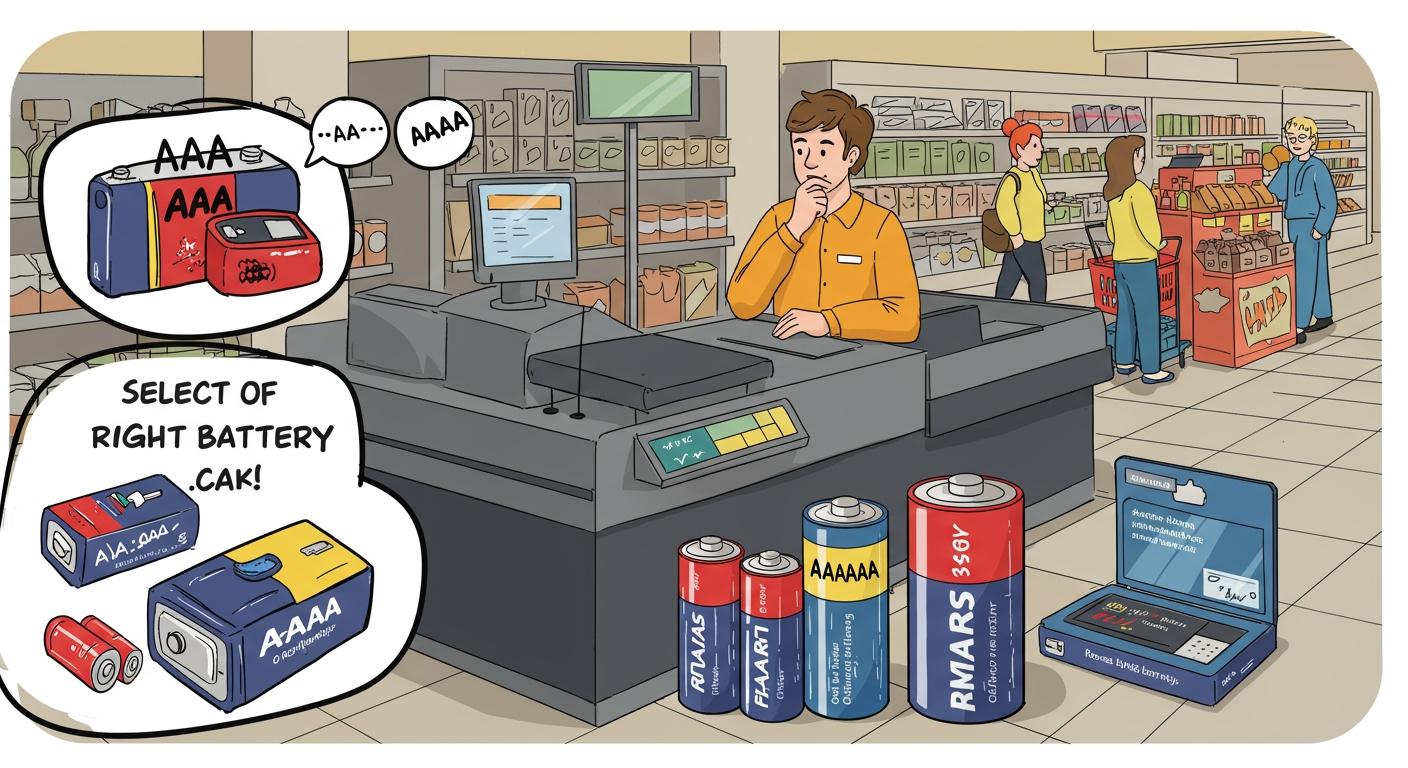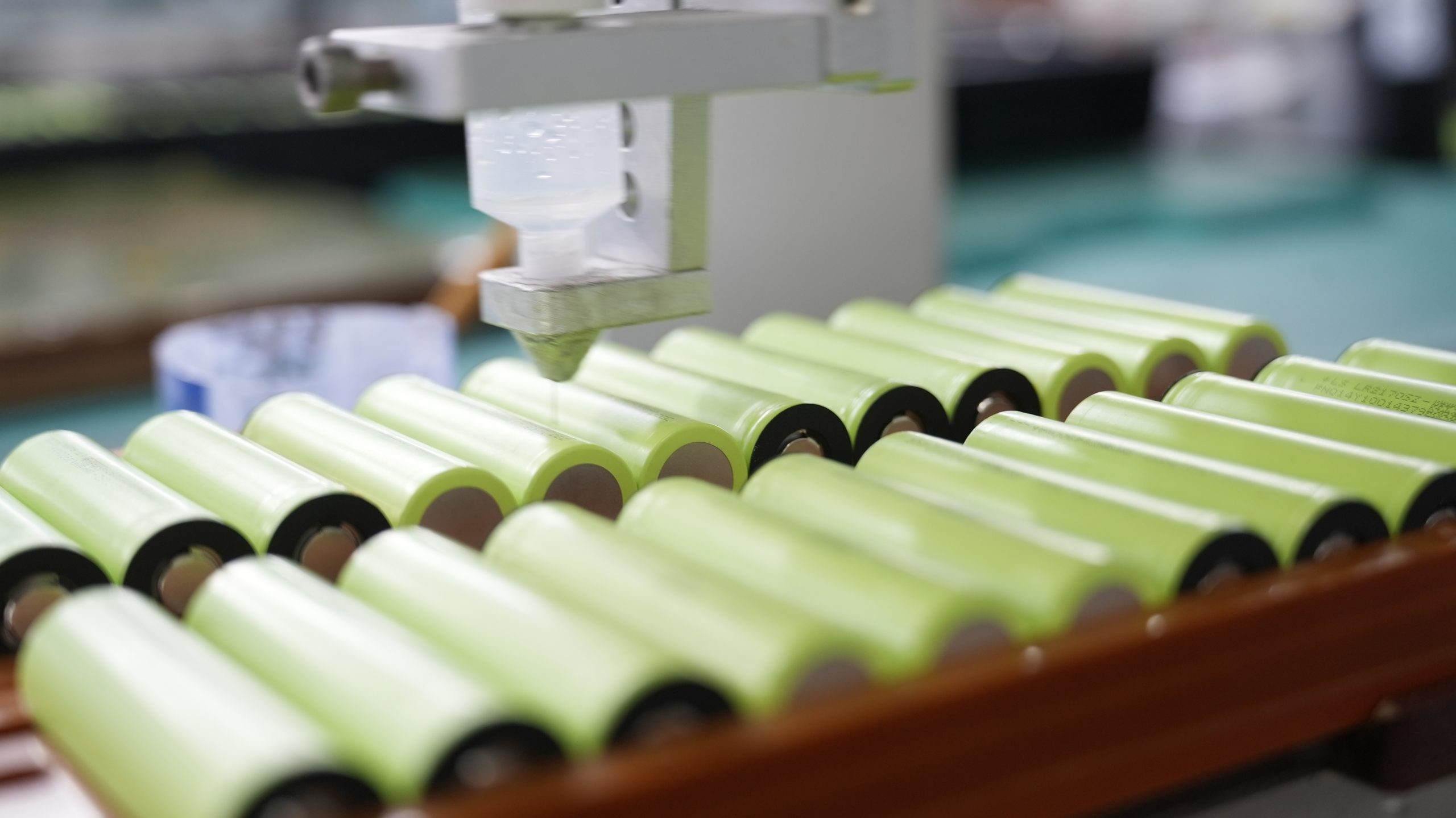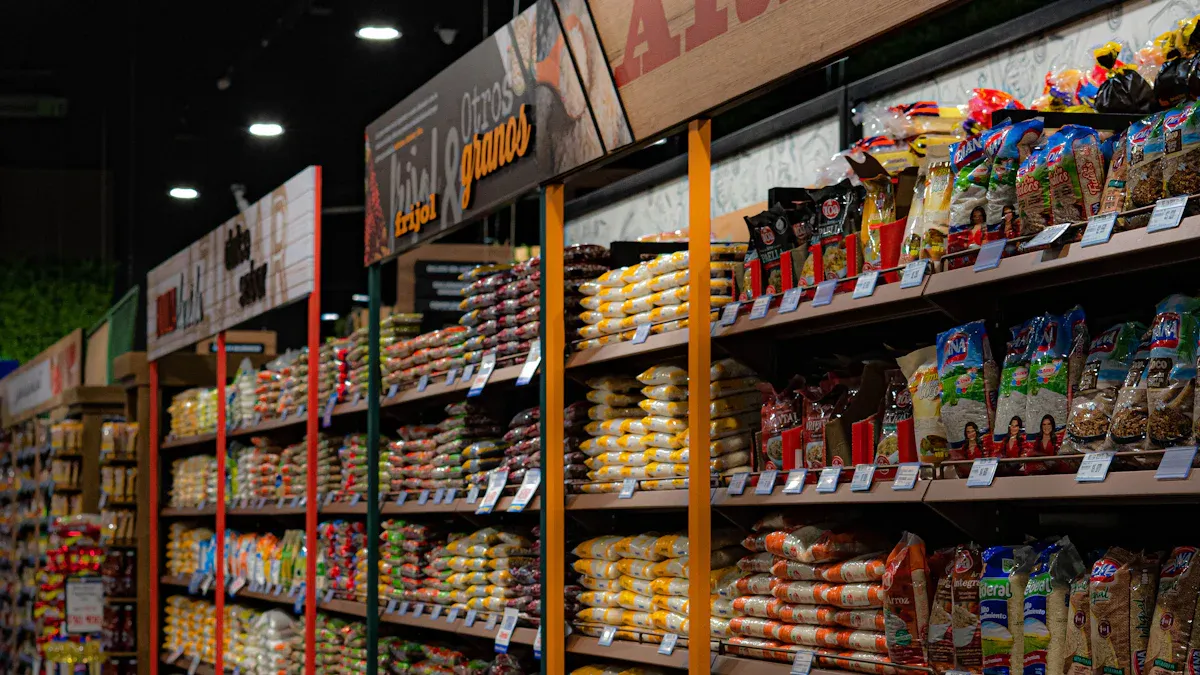
When you operate a supermarket, you know that battery choice directly affects food scale accuracy and reliability. Lithium weighing machine batteries stand out for their exceptional energy density, long lifespan, and high reliability. You should always match the right battery type and size to your digital food scale to ensure consistent accuracy and performance. Take a look at the table below to compare battery quality and lifespan for common weighing machine battery options:
Battery Type | Average Lifespan (Years) | Charge-Discharge Cycles |
|---|---|---|
Lithium-Ion | 10 to 15 | 2,000 to 8,000 |
Lead-Acid | 3 to 5 | 300 to 1,200 |
Flow | Up to 20 | Over 10,000 |
Lithium weighing machine batteries provide more cycles and stable power, making them the best food scale battery for POS scales. Always consider battery quality, maintenance needs, and compatibility with your equipment when you choose the right lithium battery. If you want to know how to choose the right lithium battery for your weighing machine, focus on quality and compliance for long-term success.
Key Takeaways
Choose lithium weighing machine batteries for superior accuracy and reliability in food scales. They provide stable voltage and consistent power.
Consider battery lifespan and maintenance needs. Lithium batteries last longer and require minimal upkeep compared to lead-acid or NiMH options.
Match battery capacity to your POS scale’s requirements. Selecting the right capacity ensures uninterrupted operation during peak hours.
Prioritize safety features when selecting batteries. Look for secure containment and overcharge protection to prevent accidents.
Regularly check battery health and replace as needed. Monitoring helps maintain accuracy and reliability in your supermarket operations.
Part1: Battery Impact
1.1 Food Scale Accuracy
You depend on precise measurements for every transaction in your supermarket. The battery you choose for your digital food scale directly affects food scale accuracy. When you use low-quality or nearly-depleted batteries, you may notice:
Fluctuating measurements
Slow response times
Calibration errors
Inconsistent taring
The display flickering or turning off
Lithium weighing machine batteries deliver stable voltage and consistent power. This stability ensures your food scale battery supports accurate readings every time. You avoid costly mistakes and maintain trust with your customers.
1.2 Reliability
Reliability matters in every supermarket operation. If your weighing machine battery fails, you risk downtime at the point of sale. Lithium weighing machine batteries offer long service life and high cycle counts. You can count on these batteries to keep your POS scales running without interruption. When you use a high-quality food scale battery, you reduce the risk of unexpected shutdowns and maintain smooth checkout experiences.
1.3 Efficiency
Efficiency drives your business forward. Lithium weighing machine batteries improve efficiency by reducing maintenance needs and extending replacement intervals. You spend less time on battery changes and more time serving customers. Lithium batteries also recharge quickly and hold their charge longer than other types. This means your food scale battery works harder and lasts longer. You see how lithium weighing machine batteries improve accuracy and efficiency in daily supermarket operations.
Tip: Choose lithium batteries for your POS scales to maximize uptime and minimize maintenance.
Part2: Battery Types

2.1 Lithium Weighing Machine Batteries
You see lithium weighing machine batteries used in many industries, these batteries offer high energy density, long lifespan, and minimal maintenance. You find several lithium chemistries in the market, such as LiFePO4, NMC, LCO, LMO, LTO, solid-state, and lithium metal. Each chemistry provides unique benefits for different applications.
Lithium weighing machine batteries deliver stable voltage and consistent performance. You can rely on these batteries for accurate readings and reliable operation in your POS scales. The table below compares lithium-ion batteries with other common battery types for food scales:
Battery Type | Energy Density (Wh/kg) | Lifespan (Years) | Maintenance Required |
|---|---|---|---|
Lithium-ion | 150 to 200 | 8 to 10 | No |
Lead-acid | 30 to 50 | 1 to 2 | Yes |
NiMH | 60 to 120 | 2 to 4 | No |
You notice that lithium-ion batteries outperform lead-acid and NiMH batteries in energy density and lifespan. You do not need to perform regular maintenance with lithium weighing machine batteries, which saves you time and resources. You can read more about lithium battery sustainability here.
Note: Lithium weighing machine batteries support high cycle counts and stable power delivery. You get the best lithium battery for portable weighing machines when you choose the right chemistry for your application.
2.2 Other Food Scale Battery Options
You may encounter other food scale battery options, such as lead-acid, NiMH, coin cells, and flat lithium batteries. Each type has advantages and disadvantages. Lead-acid batteries cost less but require frequent maintenance and replacement. NiMH batteries offer moderate energy density and lifespan but do not match lithium performance.
Coin cells, such as CR2032 lithium coin cells, provide long-lasting power in a compact form. You find these batteries in small food scales and portable devices. Flat lithium batteries, including lithium polymer types, deliver high energy density and rechargeability. You see these batteries in high-performance scales and industrial weighing systems.
The table below highlights the main advantages and disadvantages of coin and flat lithium batteries:
Battery Type | Advantages | Disadvantages |
|---|---|---|
CR2032 lithium coin cell | Long-lasting, Lightweight, Excellent voltage stability | Not rechargeable, Slightly more expensive |
Lithium polymer (built-in) | High energy density, Rechargeable, Eco-friendly | Requires USB/AC charging, Not easily replaced |
You should consider the application scenario before selecting a food scale battery. Industrial and medical sectors often require lithium weighing machine batteries for their reliability and performance. You can learn more about conflict minerals in battery manufacturing here.
2.3 Best Food Scale Battery Choice
You want the best food scale battery for your supermarket POS scales. Lithium weighing machine batteries provide superior energy density, long lifespan, and minimal maintenance. You avoid frequent replacements and reduce downtime. Lithium-ion batteries deliver stable voltage, which ensures accurate measurements and reliable operation.
You benefit from choosing a high-quality food scale battery that matches your equipment specifications. Lithium weighing machine batteries support sustainability goals and comply with industry standards. You see these batteries used in infrastructure, industrial, and consumer electronics sectors due to their proven performance.
Tip: Select lithium weighing machine batteries for your POS scales to maximize uptime, accuracy, and cost-effectiveness.
You ensure your supermarket runs smoothly when you choose lithium weighing machine batteries. You get the best food scale battery for long-term success.
Part3: Key Features
When you select a food scale battery for your supermarket POS scales, you must evaluate several key features. These features determine the performance, safety, and total cost of ownership for your digital food scale. Understanding these aspects helps you choose premium batteries that deliver reliability, efficiency, and long shelf life.
3.1 Capacity
Battery capacity measures how much energy a battery can store, usually in milliampere-hours (mAh). The right capacity ensures your POS scale operates without interruption, even during peak hours. You should match the battery capacity to your operational needs:
Batteries under 1000mAh work best for low-power POS devices. These batteries offer portability and suit light power demands.
1000-2000mAh batteries fit mid-range POS systems. They balance power and size, making them ideal for mobile applications.
2000-3000mAh batteries support more demanding POS scales. You get reliable power for complex transactions and longer use.
Batteries above 3000mAh serve heavy-duty systems. These batteries provide extended operational times in high-demand environments.
Selecting the correct capacity improves food scale accuracy and reduces downtime. You avoid frequent recharging and ensure your digital food scale maintains consistent performance.
3.2 Lifespan
Longevity is a critical factor when you invest in a food scale battery. Lithium weighing machine batteries stand out for their long shelf life and high cycle counts. You benefit from fewer replacements and lower maintenance costs. A longer lifespan means your POS scale remains operational for years, supporting your business with minimal interruptions.
You should look for batteries that offer thousands of charge-discharge cycles. This feature ensures your investment lasts and supports efficiency in daily operations. Longevity also contributes to sustainability, reducing waste and supporting your environmental goals. You can learn more about lithium battery sustainability here.
3.3 Rechargeability
Rechargeable food scale batteries provide significant advantages over single-use options. You reduce operational costs and environmental impact by choosing rechargeable batteries. Lithium batteries are the preferred choice in POS scales due to their high energy density and rechargeability.
You should select a rechargeable food scale battery that matches your scale’s requirements. Rechargeable batteries allow you to maintain uptime and avoid frequent replacements. Many lithium chemistries, such as LiFePO4 and NMC, offer excellent rechargeability and long shelf life. These batteries are widely used in medical, robotics, security systems, infrastructure, and industrial sectors.
Tip: Rechargeable lithium batteries paired with a quality Battery Management System (BMS) ensure safe and efficient charging cycles.
3.4 Safety
Safety is essential when you handle lithium batteries in a commercial environment. You must choose batteries with robust safety features to prevent accidents and ensure compliance with regulations. The table below outlines recommended safety features for supermarket POS scale batteries:
Safety Feature | Description |
|---|---|
Secure Containment | Ensure batteries are securely contained to prevent movement and short circuits. |
Insulation | Use insulation or individual wrapping to avoid direct terminal contact. |
Damage Prevention | Never use or sell damaged or leaking batteries due to safety risks. |
Flame Retardant Packaging | Consider flame retardant materials for added protection. |
You should also follow these best practices for battery safety:
Store batteries in a cool, dry place away from extreme temperatures.
Keep batteries away from metal objects to prevent short circuits.
Use original packaging or racks to avoid physical damage.
Rotate stock regularly to ensure older batteries are used first.
By prioritizing safety, you protect your staff, customers, and equipment. You also ensure compliance with industry standards and regulations.
3.5 Compatibility
Compatibility ensures your food scale battery fits your POS scale model and works seamlessly with its electronics. You must check voltage, size, connector type, and supported chemistries before purchasing. Lithium weighing machine batteries come in various formats to match different scale designs.
You should consult your scale’s technical documentation or supplier for compatibility guidelines. Using the wrong battery can lead to poor performance, reduced accuracy, or even damage to your equipment. High battery quality and proper compatibility guarantee optimal reliability and efficiency.
Note: Many industrial and commercial sectors, including consumer electronics and infrastructure, rely on lithium batteries for their adaptability and performance. You can review conflict minerals compliance for lithium batteries here.
When you focus on these key features—capacity, lifespan, rechargeability, safety, and compatibility—you ensure your POS scales deliver accurate results and long-term value. You see how lithium weighing machine batteries improve accuracy and efficiency in demanding supermarket environments.
Part4: Cost & Ownership
4.1 Initial Cost
When you compare battery options for supermarket POS scales, you notice a wide range in initial cost. Lithium weighing machine batteries have a higher upfront price than lead-acid or nickel-based batteries. However, the quality and long shelf life of lithium batteries justify this investment. The table below shows typical initial costs for different food scale battery types:
Battery Type | Cost |
|---|---|
Lithium | $100 |
Lead-acid | $40 |
Alkaline | $112 |
Nickel-metal hydride | $50-$60 |
Nickel-cadmium | $50-$60 |
You see that lithium batteries cost more at first, but their rechargeable nature and high quality reduce the need for frequent replacement.
4.2 Maintenance
Proper care and maintenance of lithium weighing machine batteries require minimal effort. You do not need to perform watering or equalization charging, unlike with lead-acid batteries. Regularly check the charge status, especially if the battery remains unused for long periods. This simple routine helps you maintain battery quality and ensures reliability. Lithium batteries are rechargeable and offer long shelf life, so you avoid frequent replacement and reduce downtime.
Lithium batteries require virtually no maintenance.
You only need to monitor charge status for optimal efficiency.
Lead-acid batteries demand more attention and regular servicing.
4.3 Total Cost
Total cost of ownership matters most when you plan for long-term supermarket operations. Lithium weighing machine batteries deliver significant savings over time. The table below compares total cost over five years for common battery types:
Battery Type | Initial Cost | Lifespan (Cycles) | Total Cost Over 5 Years |
|---|---|---|---|
AGM Battery (4 x 12V) | $1200 | 800 | $12,000 |
Lithium Battery (48V) | $4500 | 8000 | $4500 |
You see that lithium batteries last much longer and require fewer replacements. Their rechargeable design and long shelf life support high efficiency and accuracy. When you choose the right battery, you gain reliability and reduce total cost. If you want to know how to choose the right lithium battery for your weighing machine, focus on battery quality, longevity, and proper care and maintenance of lithium weighing machine batteries. This approach ensures your food scale battery delivers the best value and performance.
Tip: Investing in lithium weighing machine batteries means fewer replacements, lower maintenance, and greater efficiency for your supermarket POS scales.
Part5: Tips & Maintenance

5.1 Check Battery Health
You need to monitor the health of your food scale battery to maintain accuracy and reliability. Regular checks help you spot issues before they affect your POS scales. Watch for warning signs such as flickering displays, strange smells, or excessive heat. These symptoms often indicate a need for replacement. You should calibrate your battery consistently and use anti-static spray to protect against static electricity damage. Cleaning the battery compartment prevents internal damage from debris and moisture. Store batteries in a cool, dry place to avoid temperature-related problems.
Tip: Understand your POS battery specifications and use only original accessories recommended by the manufacturer. This practice ensures quality and safety.
5.2 Replace the Right Battery
When you replace a food scale battery, choose a rechargeable lithium battery pack that matches your equipment’s specifications. Check voltage, connector type, and chemistry to ensure compatibility. Avoid overcharging, as it can shorten the battery’s lifespan and reduce quality. Limit resource-intensive operations to reduce strain on the battery. Invest in backup power to maintain service during outages. Always prioritize safety by selecting batteries with secure containment and insulation.
5.3 Maintenance Tips
Routine maintenance extends the life and performance of your rechargeable battery. Charge batteries carefully and unplug them once fully charged. Extreme temperatures can degrade battery quality and lead to rapid drainage or failure. Clean regularly to prevent moisture and debris from causing internal damage. Monitor battery health and replace it if necessary. Use anti-static spray to protect sensitive electronics.
Store batteries in optimal conditions.
Calibrate batteries for accurate performance.
Avoid overcharging and overheating.
5.4 Regulatory Compliance
You must comply with state and federal regulations when choosing a food scale battery. Certification ensures safety and legal operation. The table below summarizes key certifications and standards for batteries used in supermarket POS scales:
Certification/Standard | Description |
|---|---|
16 CFR Part 1263 | Safety standard for button cell or coin batteries, including labeling and child-resistant packaging requirements. |
General Certificate of Conformity | Mandatory document for products affected by CPSC regulations, detailing compliance with safety rules. |
Children’s Product Certificate (CPC) | Required for children’s products, based on test reports from CPSC-accepted labs. |
ASTM F963 | Standard for toy safety, including requirements for battery compartments and warning labels. |
NTEP Certificate of Conformance | Certification for scales to ensure they are legal-for-trade, requiring approval from state inspectors. |
You should review these certifications before purchasing or installing a new rechargeable battery. Compliance protects your business and ensures your POS scales meet industry standards.
Choosing the right battery for your POS scales supports food scale accuracy and smooth supermarket operations. You gain several advantages when you select lithium weighing machine batteries:
Accuracy ensures precise weight measurements for correct pricing and customer satisfaction.
Reliability helps you avoid financial losses and meet industry standards.
Cost-effectiveness maximizes profitability by balancing investment and long-term benefits.
Regular maintenance and compliance with regulations keep your equipment running safely. Review your current battery solutions and upgrade to the right battery for lasting performance.
FAQ
What is the best lithium battery chemistry for POS scales?
You should choose Lithium Iron Phosphate (LiFePO₄) or Lithium Nickel Manganese Cobalt Oxide (NMC) for POS scales. These chemistries offer high cycle life, stable voltage, and strong safety profiles. They support reliable performance in commercial supermarket environments.
How often should you replace lithium battery packs in POS scales?
Most lithium battery packs last 5–10 years or 2,000–8,000 cycles. You should monitor battery health and replace packs when you notice reduced capacity, slow charging, or inconsistent scale readings.
How do lithium battery packs compare to lead-acid batteries for POS scales?
Feature | Lithium Battery Pack | Lead-Acid Battery |
|---|---|---|
Cycle Life | 2,000–8,000 | 300–1,200 |
Maintenance | Minimal | Frequent |
Weight | Light | Heavy |
You gain longer life and lower maintenance with lithium packs.
What safety features should you look for in lithium battery packs?
You should select battery packs with secure containment, overcharge protection, thermal management, and flame-retardant packaging. These features help prevent accidents and ensure compliance with industry standards.
Can you use any lithium battery pack in your POS scale?
No. You must match voltage, connector type, and battery chemistry to your POS scale’s specifications. Using the wrong pack can cause inaccurate readings or damage your equipment.




